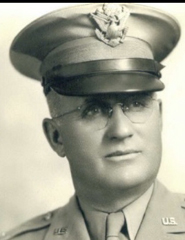Iowan Tells of Horrifying Sights at Concentration Camp
By Frank Miles
Air Power Press camp in Germany - (IDPA) -- "Jerry fighter planes yesterday shot down two transports like the one you have been riding in on the same route over which you came," other correspondents and I were informed when we landed at an air base one said was in the "shadow of Berlin."
We went by jeep to the Buchenwald concentration camp near historic Weimar, where 22,000 political prisoners from Russia, France, Poland, Holland, Czechoslovakia, Great Britain and the United States had been liberated.
Women were used as both nurses and prostitutes. Males ranged from 12 to 70 years of age. About 28,000 had been removed when word reached the commandant and guards American forces were only a few miles away. Many of them were shot down on the roads as they struggled along.
Bodies Piled Up on Track
Piled on a truck near a one-story concrete crematorium of six furnaces were more than 100 dirty, nude, skeletoned bodies. Some were horribly scarred from brutal tortures; many were blood stained from gashes and sores; most died of starvation and overwork and resultant diseases. Other bodies were stacked near a wall of the camp. Inside through the open furnace doors could be seen charred bones.
In a basement were hooks about eight feet high on the walls of a room from which captives were bound hands had been hung to strangle to death or be beaten. In a corner was a blood stained club, which landed on a victim's head if he didn't expire fast enough to suit the disciplinarian. Finger nail scratches in the white paint reflected the hopelessness, desperate effort, for the relief from agony. An elevator was used to take bodies, some of them possibly not lifeless, to fire chambers.
Scaffolds
Out in the yard were three scaffolds with a stool underneath one which condemned were stood until ropes had been adjusted. About 20 feet away was a pile of ashed of human bodies, which had not been buried or blown over the immense barbed wire prison enclosure - and adjacent countryside.
While looking at the furnace I met in the crowd of names staring at Americans there was a little fellow, who wrote his name in my notebook. He was 41. In 1943 he was seized with his parents in Czechoslovakia. The mother's whereabouts he did not know. His father had died. I shall never forget the expression on his face when I gave him a chocolate bar.
One Hospital
The hospital was a long, low, barn-like building with four tiers of six-foot shelves on each side. On them men, so thin their backbones showed through their stomachs, lay jammed together under filthy blankets. The stench was sickening. Some patients smiled and in various tongues extended greetings. Others mumbled incoherently through pain or because their minds had snapped. Some lay motionless dying. One expired while we were there.
In the spacious office of the chief medical officer of the SS Schutz Staffel, which in English means "protecting squad" was a lamp shade made of tanned human skin. The lamp hand was made of human bones. In his desk were a number of parchments of tattooed skin taken from bodies of prisoners.
Say 12,000 Russian Slain
A dutch lieutenant, captured when he tried to escape to England, showed us a place, where he said 12,000 Russians one were slain by machine guns in 24 hours. He said 30 American officers had been executed in the crematorium basement and that a princess of Hesse, who incurred the displeasure of the gestapo, had died of gangrene from burns in a harlot's home.
The prisoners worked in a V-2 factory, which American air bombers almost wholly destroyed. Food was insufficient and unpalatable always. A Belgian physician, who had done his best for the suffering, said there had been 5,800 deaths in March and 5,400 in February.
When Lt. Gen. George Patton of the third army saw the camp, he ordered the burgermiester of Weimar to assemble 1,000 citizens of the city, noted for Goethe, Schiller and Listz, to see that they not only toured the prison but witnessed a re-enactment of some of the scenes occurred there. Women screamed and fainted. Others tried to cover their eyes. Many said they wouldn't have believed it.
Source: Mount Pleasant News, May 11, 1945
![]()

